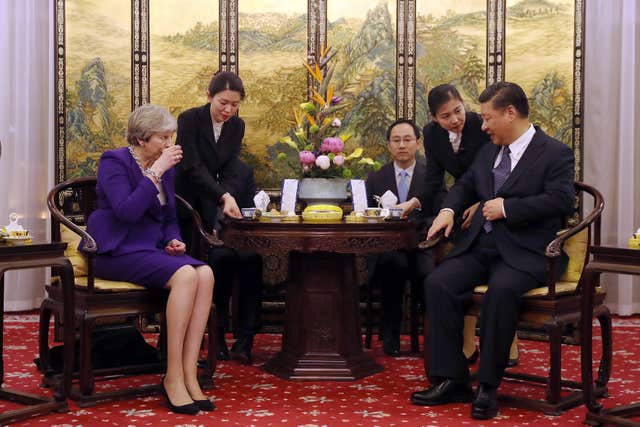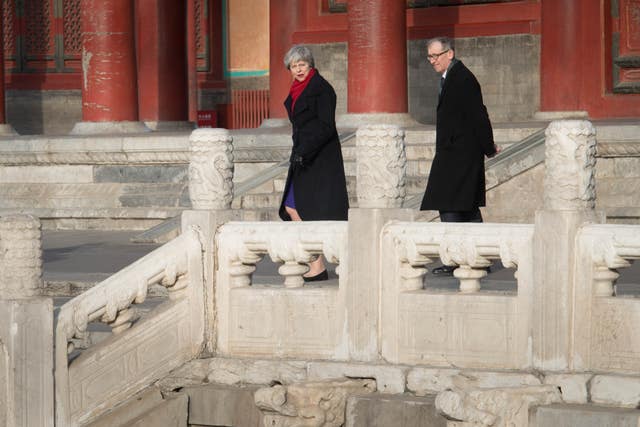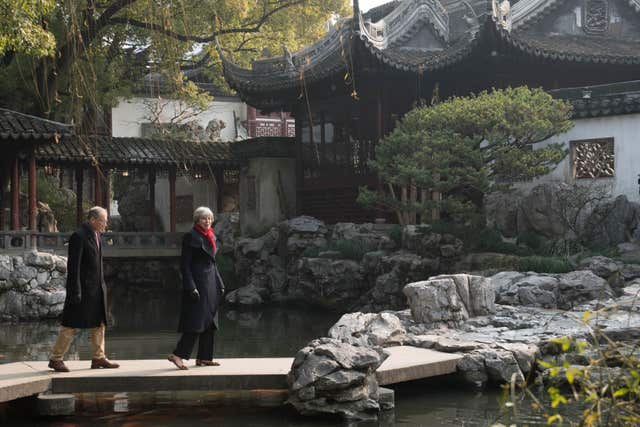
Downing Street has denied claims in the Chinese media that Theresa May “sidestepped” human rights during her three-day visit to the far eastern giant.
The Global Times applauded Mrs May for supposedly resisting “radical” pressure at home to raise concerns over the treatment of democracy protesters in Hong Kong, in order to focus on improving trade and investment links with the world’s second largest economy.
But a senior Number 10 source insisted that Mrs May had raised the issue of Hong Kong – where more than 100 activists were detained in protests over alleged encroachment by Beijing on the former colony’s partial autonomy – and broader human rights in her discussions with both President Xi Jinping and Premier Li Keqiang.
An account of the talks with Xi released by Downing Street said that both leaders had restated their commitment to the “One Country Two Systems” arrangements in place since the UK handed Hong Kong back to China in 1997.

The Global Times, which is largely viewed as a mouthpiece for the Beijing regime, said in an editorial that Mrs May was right to resist “radical” pressure to highlight human rights concerns, and instead to confine herself to “enthusiastic and positive remarks about China”.
“For the prime minister, the losses outweigh the gains if she appeases the British media at the cost of the visit’s friendly atmosphere,” said the newspaper. “China’s robust development has instilled impetus for Europe to overcome its prejudices against Beijing.”
Mrs May issued a call for gender equality in her address to business leaders in Shanghai on the last day of her trip.
In a speech to the UK-China Business Forum, the Prime Minister said: “The UK and China together have the capacity to play a huge role in advocating for gender equality. But all too often those good intentions don’t lead to positive outcomes, and that’s something we should all be working to tackle.”

She hailed the work on gender equality of Alibaba entrepreneur Jack Ma – believed to be China’s richest man – whom she met at the forum.
Mrs May said that her visit had marked Britain and China “opening a new chapter in our golden era”, with commercial deals totalling £9 billion signed.
These included a five-year export drive by Aston Martin worth £600 million and involving more than 20 showrooms for the luxury cars across China, as well as plans by Staffordshire-based Busy Bees to open a string of childcare nurseries including an international pre-school in Shanghai.
Just hours after Mrs May’s arrival in Shanghai, the city was put on alert after a van loaded with gas cannisters ploughed into pedestrians, injuring 18 people, three of them seriously.
The incident occurred as Mrs May held talks with Shanghai mayor Ying Yong in a hotel around five miles away, but her itinerary was not disrupted. Police later said the crash was believed to be an accident.

International Trade Secretary Liam Fox said that more than £9.3 billion in deals signed in China would create 2,500 new jobs in the UK, with the figure expected to rise as more agreements are sealed.
Dr Fox said: “I am delighted to have joined the Prime Minister on this crucial and incredibly fruitful visit.
“The agreements signed this week, valued at more than £9 billion, demonstrate a clear demand for British goods and services.
“As an international economic department, we will continue to develop this valuable relationship, which already benefits British companies to the tune of £59 billion in trade each year.”


Comments: Our rules
We want our comments to be a lively and valuable part of our community - a place where readers can debate and engage with the most important local issues. The ability to comment on our stories is a privilege, not a right, however, and that privilege may be withdrawn if it is abused or misused.
Please report any comments that break our rules.
Read the rules here